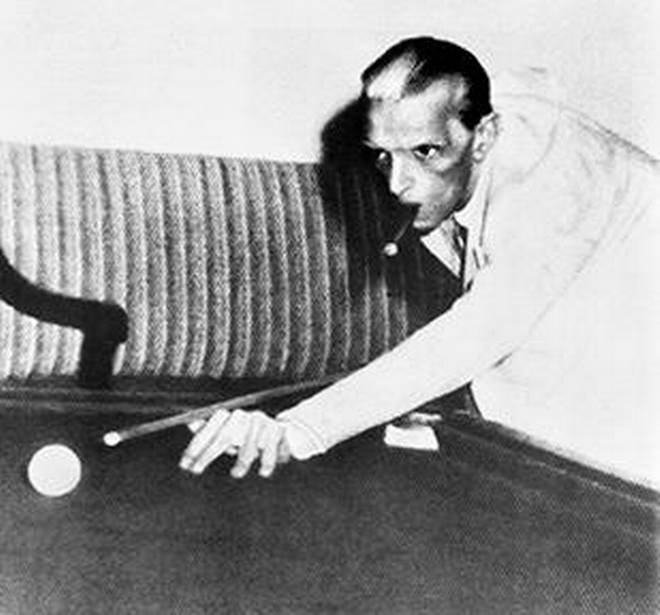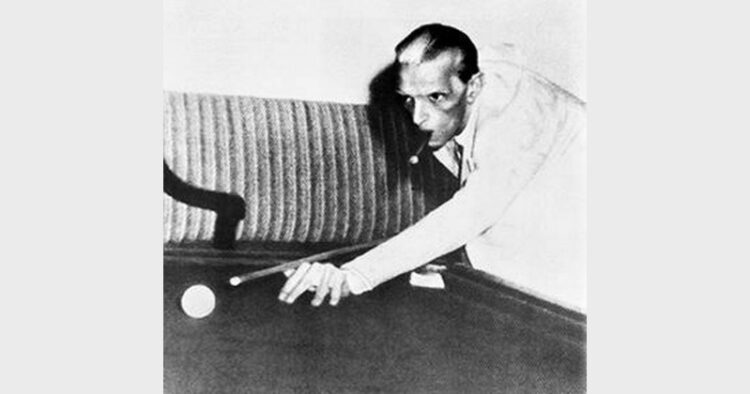Whether the picture of Jinnah is kept in AMU or thrown away is a very small issue, the big issue is that there is no place for the divisive mindset like Jinnah’s and it must be eradicated once and for all
Lalita Nijhawan

The controversy of Mohammed Ali Jinnah’s photograph in Aligarh Muslim University (AMU) has revived memories of India’s partition. Students of AMU shouted slogans for freedom from Rashtriya Swayamsevak Sangh. It seemed as if time stood still. It felt as if once again the students of AMU were pulling Jinnah”s bogey from the railway station like they did in 1943. Once again, the first Prime Minister of Pakistan and former student of AMU, Liaquat Ali Khan, has returned and so have the students carrying him on their shoulders, once again the Pakistani government has organised a camp in AMU for recruitment for their army.
Getting directly to the point, the anti-Sangh attitude of AMU students is frightening. Our nation has been free for 71 years, yet the mindset of these university students hasn’t changed. For them, the Sangh is a symbol of Hindus and India. Their slogans against the RSS only portray their hatred for none-other than India and Hindus.
Not surprisingly, to propagate the hateful sloganeering against the Sangh, many pseudo-intellectuals with divisive ideologies rushed to support the sloganeers. These are the same people who encouraged the politics of “identity” among Muslims and do not point out that they are citizens of a democratic country,that it is their duty to abide by the nation’s constitution. These people support students in the name of “democratic rights” and “freedom of expression”, but we are well aware that their agenda revolves around Islamic fundamentalism, terrorism, and separatism. Like AMU students, they do not consider India to be a nation. The reason Muslim students of AMU do not consider India as their nation is their religion, but the separatism of the pseudo-intellectuals evolves from their political ideology.
People who appeared in favour of these students admire Jinnah shamelessly. Some people have even called Jinnah great. Parveen Nishad, the newly elected Samajwadi Party MP from Gorakhpur, said that Jinnah”s contribution in the freedom struggle was not less than Gandhi’s or Nehru’s. Likewise, Swami Prasad Maurya, who joined the Bharatiya Janata Party from BahujanSamaj Party, said that Jinnah was a great man. Mani Shankar Aiyyar, an Indian Congressman who is more famous in Pakistan than his own country, called Jinnah ‘quaid e azam’ which means ‘the great leader’. These leaders consider Muslims as divisive so to win their votes they appease such tendencies.
These leaders confined themselves to a few short statements, but the so-called divisive, pseudo-intellectuals praised Jinnah by writing lengthy articles in English newspapers. One writer eulogisedJinnah’s great command over English and wrote an article titled, “Why we shouldn’t hate Jinnah?”The title of an article penned by another individual, “This is the time to exonerate Jinnah,”goes on to state, “The partition has caused the greatest damage to Indian Muslims, but accusing Jinnah or the Muslim League will not accurately analyze history.” A woman wrote, “This week was not sympathetic to Jinnah”s legacy, neither in India, nor in Pakistan.”A prominent ‘communist historian’ blamed Savarkar and Golwalkar for the partition as if the “Muslims of India”, Muslim League members and Congress leaders never wanted partition.
The Hindu-Muslim conflict spans hundreds of years. The history of partition of India is no less complicated. Who propounded the two-nation theory first is still an on-going debate. We still ponder on the endless possibilities of what was said, why and how it was interpreted. But one thing is prominently clear-there were three parties in the partition of India; Jawaharlal Nehru (Congress), Mohammed Ali Jinnah (Muslim League) and Viceroy Mountbatten (UK). Whatever these three discussed together, and what unique ideas they came up with had neither the influence of the Hindu Mahasabha nor the RSS. If anyone is to be blamed for partition then these are the parties responsible. Thus, Nehru and Mountbatten are equally blame-worthy as Jinnah for breaking the nation.
Nehru, the first Prime Minister of the country, who bore a communist inclination, was labelled ‘Chacha Nehru’ by members of Congress and Communists and consequentially all his sins were forgiven. Yet there was a need to blame someone for the partition, and all of it was placed on Jinnah. Nehru”s sycophancy towards the British is well-known, as a result when India achieved Independence he rather conveniently forgave England and joined theCommonwealth.Congress and Communist historians found a new enemy to replace the British – Hitler and Nazism. In India, the RSS was termed as a descendant of Nazis and an alliance against it began to form. This strategy was also beneficial in appeasing the divisive Muslims in the country. They were given a “target” to channel their hatred toward Hindus through the medium of RSS. The groups targeting the RSS have never bothered to deduce that the Sangh’s idea of a nation is rooted in a rich history spanning thousands of years, and not in Hitler”s “ultra-nationalism”.
The policy of targeting the RSS has also favoured the communists. On one-hand Muslims consider themselves first and foremost a part of the International Ummah; similarly, communists consider themselves as part of the International Communist Movement. Their priority has never lied with their nation. This is the reason that they always mocked the freedom struggle as well as legendary figures like Gandhi, Subhash Chandra Bose etc. and instead supported the Soviet Union and China. After Independence, Nehru and his Communist disciples distorted history, which is a separate issue, let”s return to the topic of Jinnah. Nehru and Mountbatten should be held responsible for the partition, but should Jinnah be glorified the way these divisive pseudo-intellectual writers do? Absolutely not!
We are of the strong belief that a person should be judged not on the basis of his word, but by his actions. It is true that Jinnah started his political career as a Congress leader. When the British filed a sedition case against Bal Gangadhar Tilak in 1916, Jinnah represented his case and won. It is true that Jinnah supported “secularism” in his famous speech on August 11 1947 in the Constituent Assembly of Pakistan. It is also true that despite settling in Pakistan, the country created by him, his heart yearned for his Mumbai bungalow (not for India), but despite all this Jinnah had an ugly communal face.
Jinnah announced “Direct Action Day” in Kolkata on August 16, 1946, to showcase the power of Muslims to Hindus and the British. This was followed by horrendous riots that took place throughout the week in which thousands of innocent people were killed. This week is called “Week of Long Knives”. After these events, the Muslim League played a game of violence throughout the country. When Mountbatten declared Independence many innocent lives were drenched in blood. According to an estimate, around 2 million people were killed and more than 30 million were displaced. During this violent episodes, Jinnah never appealed for peace. Jinnah, who gave a speech on “secularism” on August 11, 1947, never once told his Muslim followers to stop the massacre of Hindus. On the contrary, Jinnah ordered his army Chief to send forces to Jammu and Kashmir for capture. On August 20, 1947, the Pakistani army prepared “Operation Gulmarg” to send tribals into Jammu and Kashmir. In early September he authorisedLiaquat Ali Khan, the then Prime Minister of Pakistan, to send an army battalion and launch revolts in Jammu and Kashmir. As per his instructions on the 4th of September, 400 soldiers entered Kashmir and created massive havoc. Obviously, Jinnah was trying to repeat Bengal’s “Direct Action” strategy in Kashmir.
While Pakistani soldiers were looting and raping Kashmiri women, Jinnah took this distraction as an opportunity and cunningly devised a strategy to surmount Balochistan. Jinnah was the lawyer of the King of Balochistan, Ahmed Yar Khan a.k.a. Khan of Kalat, and negotiated Balochistan’s freedom with England. In return, Khan of Kalat gave him gold equivalent to his weight. But Jinnah did not waste much time in betraying his trust, and on 28 March 1948, his kingdom was forcibly captured by Pakistan. Very few people know that in March 1946 Samet Khan, and All India Congress Committee members met Congress President AbulKalam Azad to discuss the Independence of Balochistan. But Azad told them that Independent Balochistan would work as a British base which would be harmful to the entire Indian subcontinent. It was feared by Azad that Balochistan would become a puppet to the British, but was he also unaware of Jinnah”s reality and conspiracy? Had the Congress leadership taken the Baloch delegation seriously, perhaps we would be looking at a different version of history.
Today the Congress Party blames Jinnah and RSS for partition, but it conveniently ignores its own dubious role during partition. During the partition, Sir Evan Jenkins was the governor of the province of Punjab. The reason for this is that during the 1946 elections the Muslim League won 73 seats out of 175, but Unionist Party formed a government in coalition with Congress and Akali Dal. The Muslim League launched an agitation against it. The Coalition Chief Minister, Sir KhozarTiwana was forced to resign on the 2nd of March 1947, but the Muslim League was unable to form a government and the rule of Sir Jenkins went on till partition. Clearly, the Congress and its allies had a good hold over the state of Punjab, but why did they allow Punjab to split so easily? Similarly, the North West Frontier Province had a Congress government. In the elections of 1946, they got 30 out of 50 seats, while the Muslim League had 17. Despite the majority win and being led by the powerful leader Khan Abdul Ghaffar Khan in this region, why did Congress handover this area to Jinnah? GhaffarKhan hated the Muslim League and was against partition on religious grounds. On the province being abdicated to Pakistan against his will, he told Congress leaders – “You have thrown us to the wolves.”
What was the actual discussion that took place amongst Congress members, Muslim League and the British, what agreements were made, and why did Congress leaders concede so easily, why was Khan Abdul Gaffar Khan betrayed, why was the King of Balochistan neglected? Why did Nehru approach the United Nations without the approval of his cabinet? There are countless questions; if history were written honestly then it would be possible to get these answers. Whether the picture of Jinnah is kept in AMU or thrown away is a very small issue, the big issue is that there is no place for the divisive mindset like Jinnah’s and it must be eradicated once and for all. And that can only come about when we will boldly raise our voice in unison. India cannot bear another partition now.
(The writer is a social worker and educationist)














Comments